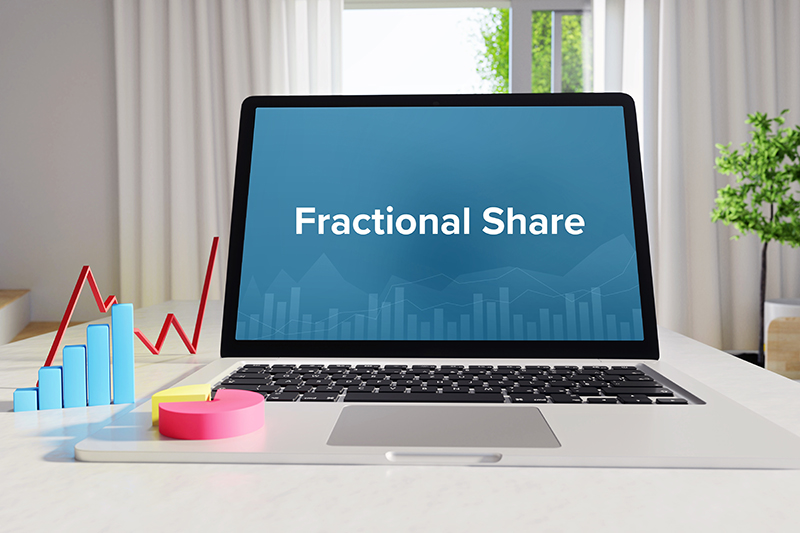Fractional Shares: What are they and how do they work?
What are fractional shares? Fractional shares refer to a slice or fraction of a whole stock. Instead of purchasing a whole share of stock, you can buy just a fraction of it. One example is if a stock was sold for $1000 per share and you purchased $300 of it then you would own 0.3 or 30% of that share of stock. Therefore, your fraction would be 30% of that stock share.
Understanding fractional shares
When understanding Fractional shares, it’s helpful to know where they come from. Fractional shares are acquired in various ways, including stock splits, mergers, dividend reinvestment plans, and acquisitions.
Stock splits don’t always result in an even distribution, therefore they can often result in fractional shares. A stock split happens when a company’s board of directors delivers more shares of stock to current shareholders. The split reduces the value of each share; however, the total value of all shares outstanding remains the same. Stock splits can be helpful for companies by lowering share prices and appealing to new investors. Brokerage firms might also intentionally choose to trade fractional shares for clients.
Another way fractional shares are created is with mergers and acquisitions. This can happen by companies combining new common stock using predetermined ratios. The ratios that result often produce fractional shares for shareholders.
Lastly, a dividend reinvestment plan in which a security pays a dividend allows investors to purchase additional shares of stock. These dividend payouts can be used to purchase more shares, which can often result in fractional shares as well.
How does a fractional share work?
Purchasing shares in fractions is a relatively new development for investing. However, these types of shares work the same as full shares in most aspects. Fractional shares increase or decrease in value at the same rate as a full share of stock. They also often receive dividends at a proportional rate to a full share, and receive the same gains and losses as full shareholders.
Is there a Downside to fractional shares?
The downside to fractional shares is that they are not transferable between broker-dealers. In order to switch to a new broker-dealer, you would have to sell your fractional shares, which could result in tax implications, fees, or other costs. Although this specific scenario applies when you are changing to a new broker-dealer, there are ways that you can trade fractional shares.
Trading Fractional shares
Trading fractional shares has become more common at many broker-dealers. For broker-dealers that support fractional share trading, you can often buy or sell fractional shares at the market, just like you would with full shares.
Is it worth buying fractional shares?
Fractional shares are appealing because they allow you to purchase a stock based on dollar amounts rather than the whole cost of a share. This is helpful for those who have limited capital to have the opportunity to invest in more companies.
Do fractional shares still pay dividends?
Yes, dividends can be paid from owning a fraction of a share. These dividends are proportionate to the fraction of the share you own. An example of how fractional shares work is if a company is trading $100 per share and you buy $50, this would mean you own ½ of a share. If the company pays a $1 dividend per share, you would receive a $0.50 dividend based on your fractional share.
How to buy fractional shares
If you are interested in buying fractional shares, it’s necessary to open an account with a brokerage company that offers fractional share investing. Some options include Schwab, M1 Finance, and Fidelity. From there you can choose the amount you want to invest and the broker-dealer will invest. Voting rights or additional fees from fractional share ownership may vary between broker-dealers, so it’s important to research and understand these differences before you choose. Another factor to consider is that not all brokerage companies will allow fractional share trading.
Banking with TAB Bank
TAB Bank is a technology-driven online bank that has provided financial success for customers since 1998. Our commitment is to provide support for financial growth and provide the best customer experience in core areas of financial services:
- Personal and business banking
- Working capital financing for distressed or growing businesses
- Small business and trucking equipment term loans
- Banking-as-a-Service API integrations and strategic partnerships with financial technology (FinTech) companies.
Choose a bank that puts you first!



